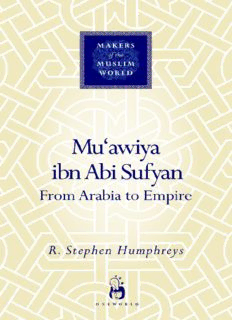
Mu'awiya ibn abi Sufyan: From Arabia to Empire PDF
Preview Mu'awiya ibn abi Sufyan: From Arabia to Empire
MAKERS of the MUSLIM WORLD Mu‘awiya ibn Abi Sufyan 0000mmuupprree..iinndddd ii 2266//0055//22000066 1133::5555::0055 Series editor: Patricia Crone, Institute for Advanced Study, Princeton SELECTION OF TITLES IN THE MAKERS OF THE MUSLIM WORLD SERIES ‘Abd al-Malik, Chase F. Robinson Abd al-Rahman III, Maribel Fierro Abu Nuwas, Philip Kennedy Ahmad ibn Hanbal, Christopher Melchert Ahmad Riza Khan Barelwi, Usha Sanyal Al-Ma’mun, Michael Cooperson Amir Khusraw, Sunil Sharma Beshir Agha, Jane Hathaway Fazlallah Astarabadi and the Hurufi s, Shahzad Bashir Ibn ‘Arabi, William C. Chittick Ikhwan al-Safa’, Godefroid de Callataÿ Karim Khan Zand, John R. Perry Nasser, Joel Gordon Shaykh Mufi d, Tamima Bayhom-Daou Usama ibn Munqidh, Paul M. Cobb For current information and details of other books in the series, please visit www.oneworld-publications.com/ subjects/makers-of-muslim-world.htm 0000mmuupprree..iinndddd iiii 2266//0055//22000066 1133::5555::0066 MAKERS of the MUSLIM WORLD Mu‘awiya ibn Abi Sufyan From Arabia to Empire R. STEPHEN HUMPHREYS 0000mmuupprree..iinndddd iiiiii 2266//0055//22000066 1133::5555::0066 MU‘AWIYA IBN ABI SUFYAN Oneworld Publications 185 Banbury Road Oxford OX2 7AR England www.oneworld-publications.com © 2006 R. Stephen Humphreys All rights reserved Copyright under Berne Convention A CIP record for this title is available from the British Library ISBN 1–85168–402–6 978–1–85168–402–1 Typeset by Sparks, Oxford, UK Cover and text design by Design Deluxe Printed and bound in India by Thomson Press Ltd on acid-free paper NL08 0000mmuupprree..iinndddd iivv 2266//0055//22000066 1133::5555::0066 For Cymbre, Michael and Brian 0000mmuupprree..iinndddd vv 2266//0055//22000066 1133::5555::0066 0000mmuupprree..iinndddd vvii 2266//0055//22000066 1133::5555::0066 CONTENTS Preface and Acknowledgments ix 1 THE PROBLEM OF MU‘AWIYA 1 Mu‘awiya in the eyes of later Muslims 3 How do we know what we claim to know: the sources for Mu‘awiya’s life 10 Mu‘awiya’s career: a chronological sketch 19 2 THE FIRST THREE DECADES (600–632) 23 The Meccan milieu 23 The politics of genealogy: why Mu‘awiya’s ancestry is important 28 The lineage of Mu‘awiya 30 The Banu Umayya 31 The descendants of ‘Abd Manaf: the clans of ‘Abd Shams and Hashim 33 3 LAYING THE FOUNDATIONS OF POWER: MU‘AWIYA AS MASTER OF SYRIA (632–656) 43 Mu‘awiya and the conquest of Syria 43 Mu‘awiya becomes Governor 45 The war against Byzantium 50 The war at sea: creating the Muslim navy 53 The war in Anatolia and Armenia 58 Mu‘awiya and the Arab tribes in Syria 60 0000mmuupprree..iinndddd vviiii 2266//0055//22000066 1133::5555::0066 4 THE FIRST CIVIL WAR AND MU‘AWIYA’S RISE TO POWER (656–661) 65 The revolt against ‘Uthman 65 The aftermath: who can claim the right to rule? 71 The confrontation between ‘Ali and Mu‘awiya 77 5 COMMANDER OF THE FAITHFUL (661–680) 85 The war against Byzantium renewed 104 6 THE PRINCE OF OUR DISORDER: MU‘AWIYA AS A SYMBOL OF CULTURAL TENSION 115 Bibliography 137 Index 143 0000mmuupprree..iinndddd vviiiiii 2266//0055//22000066 1133::5555::0066 PREFACE AND ACKNOWLEDGMENTS Mu‘awiya ibn Abi Sufyan is a figure of critical importance in the formative period of the caliphate and the Arab-Muslim Empire but even in the flood of scholarship dealing with the first Islamic century he has received surprisingly little attention. The last scholar to devote close attention to him and his era was the learned but erratic Henri Lammens. That was nearly a century ago and even Lammens, lover of the Umayyads as he was, never devoted a full-length monograph to the dynasty’s founder. More recently, the admirable but necessarily concise article by Martin Hinds in the Encyclopaedia of Islam (published in 1991) suggests that he would have been Mu‘awiya’s ideal biographer, but his untimely death deprived us of that pos- sibility. The reasons for this neglect – perhaps a better word would be skittishness – are many and some of them should become clear in the pages that follow. However, Mu‘awiya was and is a hard man to pin down. It is hard to be sure just what we really know about him and hard to make sense of what we do know (or think we know). In addition, many problems and trends in early Islam, which seem shadowy or ill-formed during Mu‘awiya’s lifetime, become much easier to talk about in the context of the decades following his death. I hope that this book will help to renew interest in this remarkable man. This is not, however, a book for early Islamic specialists. It is aimed at readers who are just beginning to get involved with the study of Islamic history – whether mem- bers of the Muslim diaspora, who want to learn more about ix 0000mmuupprree..iinndddd sseecc11iixx 2266//0055//22000066 1133::5555::0066
Description: